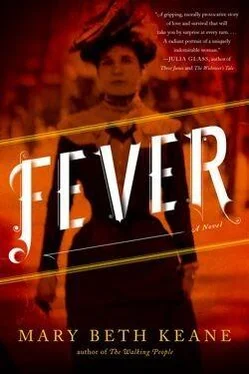“And where have you been staying?”
“Orchard Street.”
“Oh, Christ.”
“It’s not bad. I rent my bed from a family and meals are included. There’s a son. Samuel.”
“What’s their name?”
“Meaney.”
Mary wondered where her things were now — her pots and pans. Her clothes. The silver teapot that had been Aunt Kate’s. Let it go, she breathed. Let it go. She reached for every piece of information he gave her and tried to make the parts fit into a whole. Alfred coming and going on Orchard Street, sitting down for meals with a family she’d never seen, careful of himself around Samuel, heading out to the Crystal Springs stables and working a full day. She wanted to ask him about drinking, if Mrs. Meaney waited up for him, if they helped him to his bed at night and took off his socks and shoes and reminded him to wash his sheets once a week.
“So where will I go? Later today?” Mary asked.
“Come to the stable. I’ll be there late anyway. My room on Orchard isn’t big. And with the boy there I doubt they’ll allow you to stay. Or—”
“Or?”
“Or you could stay with someone until we get a place of our own again. Someone in the old building?”
Mary heard her name called from the end of the alley. The break was almost up, and Mr. O’Neill wanted to go over what would happen next before they reconvened. Her guard had fallen asleep with his hat pulled down low over his eyes. She wouldn’t be foolish enough to try to escape today anyway. Not when she’d be free in a matter of hours.
“I have to go,” Alfred said. “I’m late as it is.” They brushed the crumbs off their laps, and then he took her into his arms and hugged her, lifting her off the ground for a moment before setting her back down. “I’m sorry, Mary. I’m sorry I didn’t tell you. We’ll figure it out later. When we see each other. We’ll figure it all out. I promise.” He told her the address of the stable.
“Yes. Okay. Later.”
“A lot has changed, Mary. You’ll see.”
She’d been a child when she met Alfred, only seventeen, more than twenty years of her life tied to this person, no way to untangle that knot now. They’d moved into the rooms on Thirty-Third Street in the summer of 1894, when Mary was twenty-five. Aunt Kate had died of pneumonia over the winter, and Paddy Brown had gone from saying very little to saying nothing at all.
“Kate loved Alfred,” Mary said gently to the old man on the day she told him that she’d be moving out, that she and Alfred had found a place together.
“Kate thought he would marry you,” Paddy Brown said as he felt along the mantel for his tin of tobacco. Mary found it for him, pried it open, removed a plug, and offered it on her palm. When he got the pipe started she sat by him, and he put his hand on top of her head. “Take the things she wanted you to have,” he said after a while. It was the longest conversation they’d had in six months.
For weeks after moving in together, after arranging the few things she’d brought from Kate’s, after going to the market and buying new bed linens to fit their new double bed, and a bright yellow tablecloth for their new kitchen table, she thought she’d never rest again. What woman could rest with him so near, and even when he fell asleep she’d lie awake, contemplating the weight of his arm where it lay across her ribs, the gentle tug she felt when the stubble of his jaw got caught on her hair. When she worked, all she could think about was getting home to him, and he said it was the same for him. They talked late at night over coffee, when they went to bed, when they woke up, and when they weren’t together they stored up all the things the other would be interested in and carried those items home. Even when winter came, and the gas-meter jar was often empty, they simply crawled into bed together and piled every blanket on top and then shivered with their hands cupped over their mouths. He’d take her frozen feet and pull off the layers of stockings until they were bare and then he’d lift up his sweaters and press her feet to his warm chest. When Mary thought of those days now, she could still feel that astonished joy, that belief that no one else in the world could possibly be happier than they were.
Alfred hugged her again, and released her again, and there was something in the hug and the release that told Mary something was not right.
Again, Mr. O’Neill shouted her name. The guard came over and stood beside her.
It was the time, probably. Twenty-seven months could make any two people a little awkward together, even two as close as Mary and Alfred. Also the guilt, Mary remembered. Alfred was always like a hangdog when he was guilty, and she shouldn’t have ridden him for not writing more often. Not when they were about to be happy and together again, Alfred working, eating three square meals, home at nights. Maybe leaving Thirty-Third Street was a good thing. Now they could get a new place together and truly start over.
“I love you, Mary. I really do.”
“All right, Alfred,” Mary said. “We’ll talk about that later.”
“We will,” he agreed.
Together, they walked down the alley toward Mr. O’Neill, who was pointing to his watch and frowning.
• • •
Everyone came back from lunch recess more overheated and red faced than when they left. A few of the reporters did not return at all, and Mary wondered if that was because they’d felt certain of the outcome, and if so, what their predictions had been. She noticed Dr. Baker sitting in the second row. The men seated beside her had their backs to her, talking to other men.
The scientists talked about new discoveries in the world of contagious diseases, new vaccines that were in development, how it was likely that more people like Mary would be discovered, people who carried disease but never succumbed to it themselves. They used the words bacilli, serum, agglutinins : words that made Mary feel like her mouth was stuffed full of cotton that she couldn’t manage to spit away.
Eventually, they began discussing her capture — specifically, why Dr. Soper and the Department of Health decided to take her by force. It would be one thing if this woman were an educated person, the Department of Health officials argued one by one, but Mary Mallon had no formal education, and lived with a man of low moral character, to whom she was not married. Several employers had reported that they didn’t like to cross Mary, didn’t like to demand veal when she’d planned on poultry, and that wasn’t natural, was it? What kind of cook inspires that kind of caution in an employer? Mrs. Proctor of East Seventieth Street recalled a time when she’d asked Mary to make Irish stew, assuming it would be one of her specialties, and Mary refused!
When Bette answered the door of the Bowen residence on that cold March morning in 1907, the police officers pushed past her and spread throughout the house. “She’s not here!” Bette shouted, and the note of urgency in her voice reached Mary, who was up on the third floor. She pulled back the curtain of the nearest window to see the police truck. She heard someone running up the back stairs, and discovered that she couldn’t move. “The police are here,” Frank said the instant he appeared at the door. “I have an idea.”
Mary saw the solution before he said it out loud. “The Alisons,” she said. The Alison family, who lived next door to the Bowens, had recently had a piece of their fence cut open behind the homes so that their servants could travel back and forth. Mrs. Alison and the children had left for Europe a week earlier, and Mr. Alison would be at his office all day. Frank held up his hand as they listened to the brisk footsteps of the officers walking through the rooms of the floor below them. “You listen for your chance,” he said. Mary nodded and felt suddenly very cold. Her whole body was covered in a thin layer of sweat, and she began to shiver. Her coat was downstairs in the servants’ closet and there would be no time to get it. It was snowing outside.
Читать дальше












